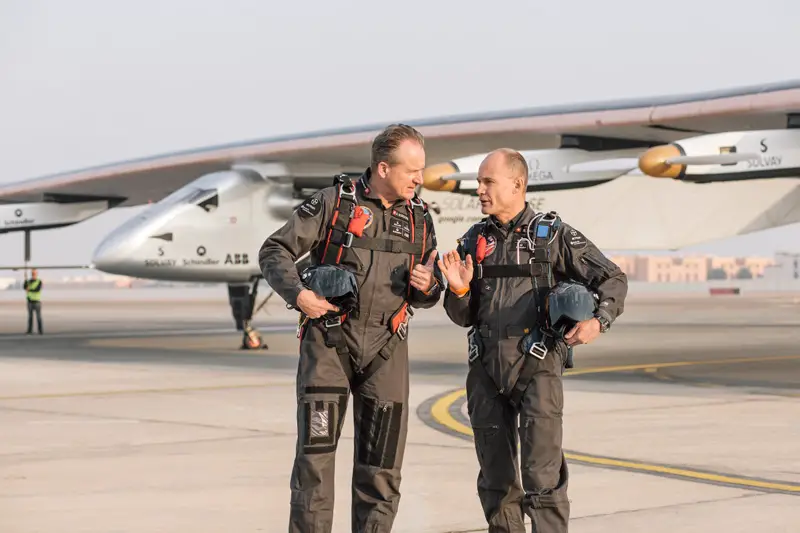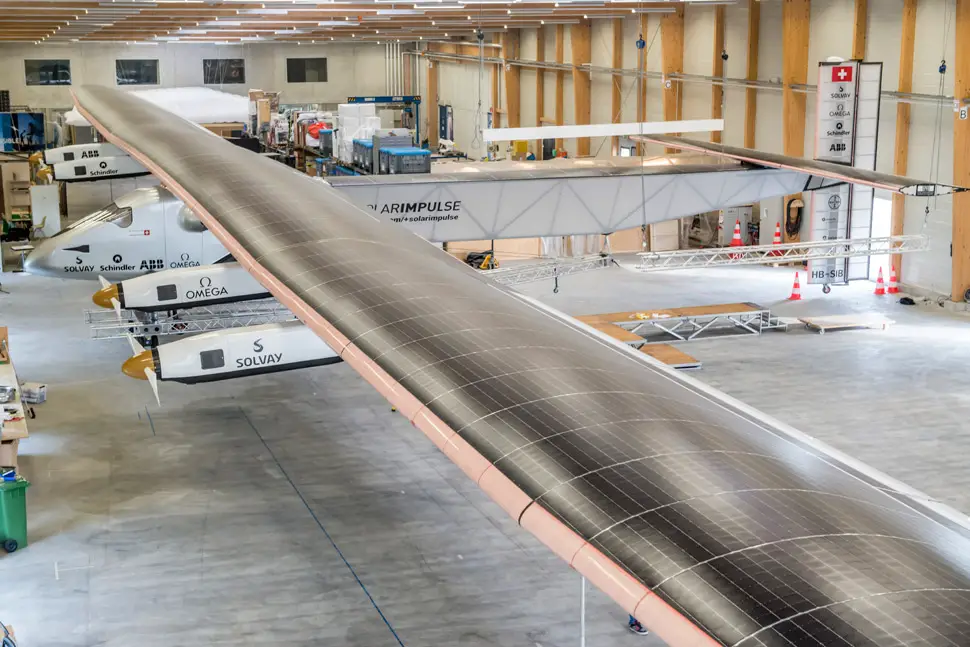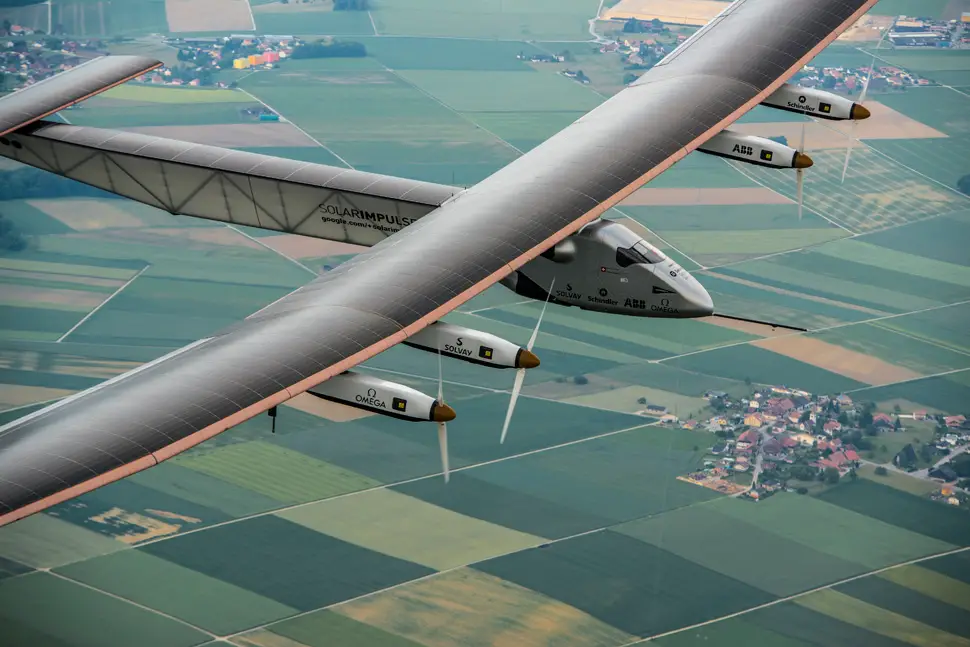
27th July 2016 The first solar-powered aircraft to circumnavigate the Earth Solar Impulse 2 has become the first solar-powered aircraft to circumnavigate the Earth – a journey of 43,000 kilometres (26,700 miles) – proving that clean technologies can achieve the impossible.
Taking turns at the controls of Solar Impulse 2 (Si2) – their zero-emission electric and solar airplane, capable of flying through day and night without fuel – Bertrand Piccard and André Borschberg have succeeded in their crazy dream of achieving the first ever round-the-world solar flight. By landing back in Abu Dhabi after 23 days of flight and 43,041 km travelled in a 17 leg journey, Si2 has proven that clean technologies can achieve the impossible. Coming from Egypt, the aircraft landed back in Abu Dhabi yesterday morning at 4:05am local time (UTC+4) completing the final leg of an endeavour that began on 9th March 2015 when Si2 set off from Abu Dhabi with André Borschberg at the controls. Taking turns in the single-seater cockpit, Piccard and Borschberg flew across Asia, the Pacific Ocean, the USA, the Atlantic Ocean, the Mediterranean and the Middle East. A total of 19 world records were set or are still pending by the World Air Sports Federation (FAI). Of particular note were Borschberg's flying five consecutive days and nights over the Pacific from Japan to Hawaii in the longest duration a solo airplane of any kind has ever flown, and when Piccard achieved the historic first crossing of the Atlantic Ocean in a solar airplane. For the two Swiss pioneers, it's the accomplishment of a dream that was considered impossible by many experts and demonstrates that clean energies and efficient technologies offer tangible solutions for sustainable air travel.
Bertrand Piccard had the vision of an airplane of perpetual endurance after his non-stop round the world balloon flight in 1999, when he made the promise to circumnavigate the Earth again, but this time without any fuel. In 2004, he began bringing together partners who provided funds and technology for this adventure and partnered with André Borschberg. An entrepreneur and skilled aviator, Borschberg took on the technical challenge of developing the solar airplane and making it fly. More than taking turns at the controls of Si2 in the air, the first ever round-the-world solar flight is also a tandem achievement on the ground: while Piccard developed the project outreach to promote clean technologies, Borschberg pulled together the team that designed and constructed Si2 as well as organised the flight missions. "This is not only a first in the history of aviation – it's before all, a first in the history of energy. I'm sure that within 10 years, we'll see electric airplanes transporting 50 passengers on short to medium haul flights." said Piccard, addressing the crowds after exiting the cockpit of Si2. "But it's not enough. The same clean technologies used on Solar Impulse could be implemented on the ground, in our daily life." "Flying one leg with a completely new type of airplane is difficult enough, but flying around the world is a real challenge," said his partner Borschberg. "More than a demonstration, it's the confirmation that these technologies are truly dependable and reliable. There is so much potential for the aeronautical world: while one hundred percent solar powered airplanes might take longer to materialise, electric planes will develop in the near future because of their tremendous advantages, such as energy efficiency." UN Secretary-General Ban Ki-moon spoke to Bertrand Piccard, live from the Si2 cockpit, a few hours before the landing in Abu Dhabi: "Solar Impulse has flown more than 40,000 kilometres without fuel, but with an inexhaustible supply of energy and inspiration. This is a historic day for Captain Piccard and the Solar Impulse team, but it is also a historic day for humanity," said the UN leader. "You may be ending your around the world flight today – but the journey to a more sustainable world is just beginning. The Solar Impulse team is helping to pilot us to that future." Looking forward, Bertrand Piccard and André Borschberg will continue to actively promote the use of modern clean technologies as a way to improve the quality of life on Earth. Firstly, through the already announced creation of the International Committee for Clean Technologies that will build on the #futureisclean initiative to bring independent and credible guidance on energy policy to governments and businesses. Secondly, by carrying on the work initiated by the engineering team on unmanned and high endurance electric aircrafts, which could fly at high altitude for months – offering services with exponential added value and complementing the work done by satellites today, in a flexible and sustainable way. "Solar Impulse is very well positioned to contribute to the next generations of manned or unmanned electric aircrafts. By capitalising on the engineering skills and expertise gained over the past decade, we will continue to work to encourage concrete innovations and disruptive solutions," said Borschberg.
"We are pleased to welcome back Bertrand Piccard and Andre Borschberg after their outstanding success in circumnavigating the world using only the power of the Sun," said Sultan Ahmed Al Jaber, minister of state in the United Arab Emirates and chairman of Masdar, a company located in Abu Dhabi and specialising in clean technology, renewable energy, and sustainable development. "As a leader in developing innovative renewable energy projects and technologies, Masdar is committed to supporting groundbreaking initiatives like Solar Impulse which will inspire and deliver a more sustainable future. Solar Impulse has proven just how practical the application of solar energy can be. It will also provide valuable data that will lead to critical improvements in two key areas, energy storage and efficiency. Masdar is truly excited about the endless possibilities of solar energy and we will be part of taking such technologies to the next level," Dr. Al Jaber concluded. As stated in Bertrand Piccard's manifesto for clean technologies written in 2004, Solar Impulse's ambition is "for the worlds of exploration and innovation to make a contribution to the cause of renewable energies; to demonstrate the importance of clean technologies for sustainable development; and to place dreams and emotions back at the heart of scientific adventure." There is still much to be done to make the world we live in more energy efficient, but through innovation and pioneering spirit, the first ever round-the-world solar flight is credible proof that change is possible and that there is reason to hope for a more sustainable world.
---
Comments »
|









